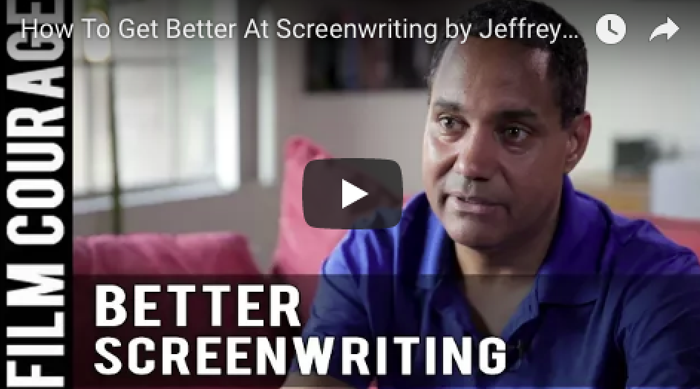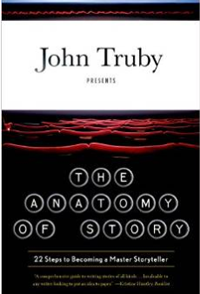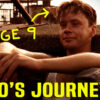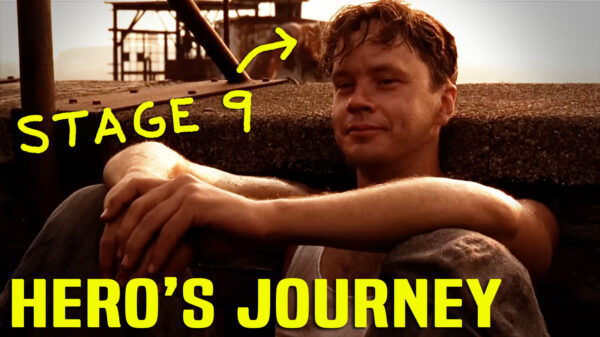
Watch the video interview on Youtube here
Film Courage: When do you start writing everyday?
Jeffrey Reddick, Screenwriter: About 11:00 a.m. I usually roll out of bed and have my routine where I’ll say some prayers, meditate a little (not much), read the news, see what’s going on, and pack up and usually go over to the coffee shop and start writing. But I’m also a night owl, too. So I stay up late writing. So it’s sporadic because I am usually working, juggling like four or five different things at one time. I’m usually hopping around to make sure I’m on top of whatever needs to be done first.
Film Courage: How long are you writing for?
Jeffrey Reddick: It’s on and off pretty much all day. I mean, I’ll be up late watching TV, but still have my laptop on writing a little bit. It depends. If I have a writing assignment then I’ll be more structured in it as far as I will focus more on that and then try to like have fun and have a life the rest of the time that I’m not writing. But if I’m in a stage where I’m like working on four or five different things trying to get them off the ground, I’m usually writing quite a bit.
Film Courage: Interesting. So you go to the coffee shop, do you ever write here [referring to Jeffrey’s place]?
Jeffrey Reddick: Sometimes, but if I stay here I get very distracted like I want to watch TV, I want to take a nap, I’m very comfortable here. I like to go to the coffee shop because I get my socializing done, too. Because I have friends there and stuff like that. So I like to get out and do that, as well.
Film Courage: Are there a lot of regulars there, too?
Jeffery Reddick: Yeah. There’s a lot of writers.
Film Courage: Nice. Do they ask you what you’re writing? Or no one really asks that they just kind of know?
Jeffery Reddick: Yeah, people will talk to you. Especially if you go there a long time and you’ve made friends with people. They kind of know what you’re up to and if they follow you on social media and you’re talking about stuff, they will ask you about what you’re doing and things like that.
It’s fun. It’s very transitory though, too. Because there’s a couple regulars, but a lot of the writers if they move they will go to another coffee shop or they’ll go work at the WGA. It has a space to work at or people rent spaces now. Which I’m actually thinking about doing because I think I broke it down and I forgot what the place is called but there’s a company where you can go rent an office space (and can’t remember the name).
But I did the math and it’s like oh well for a cup of Starbuck’s coffee and a donut every day, I can actually rent this place for a month and they have free coffee all day.
But I drink tea, so I have to check and make sure they have tea.
Film Courage: It’s probably not as good as Starbucks.
Jeffery Reddick: No, but it’s cool. You can get a desk and a computer (you have your own little spot). It does kind of put you in a different mindset if you’re leaving your own place to go to work because even if I’m walking to Starbucks, even if I’m going there to work and I’m going there to see my friends and I’m going to be distracted and you never know what’s going to happen. There is some wisdom to having a writing space that’s an office. I’ll do that at some point. I haven’t done that yet. But I’ll have a place where I’ll have an office that’s just a separate building aside from where I am living.
Film Courage: Yeah, I was always opposed to coffee shop writing for the longest time and then I noticed that if you have headphones on and you can still sort of see what’s going on around you, it’s actually invigorating (whatever you are working on). Even if you’re not screenwriting, you’re just working on something.
Jeffery Reddick: Yeah, you’ve got to have headphones because they’re important because people will obviously start talking to you.
Film Courage: Oh that’s true! It’s a good buffer. It’s a good social buffer to have those on. But also libraries, too. I’m just surprised that it actually does feed you and I was opposed to it for the longest time. And I can tell now why people need to get out of the house.
Jeffery Reddick: You need that little segue from being in your home to your brain going “Hey, we’re going to work now.” And if I’m just going from my bedroom to the living room it’s hard to just sit over here and say “Okay, turn on my work brain.” Because I’m like “Wait, what’s on TV? I’m going to take a nap really quick.”

Watch the video interview on Youtube here
Film Courage: Right or if I see an interesting article on like Flipboard or Pocket or something and then I’m like “Let me just read this.” And then I’m distracted.
Jeffery Reddick: One you get derailed it’s kind of hard to get the focus back again.
Film Courage: Would you say you’re very disciplined when you know that you need to get these four things done that you’re pretty good?
Jeffery Reddick: Yeah, I think my friends think I’m more disciplined than I am. I think I could probably be more disciplined. I do work hard though but it’s…I guess I am, but in my brain I’m not disciplined enough and my friends are like “You’re so disciplined.” I feel like I’d be doing more if I was more disciplined but I’m usually always juggling a lot at the same time. But you always want to make sure that you don’t have more on your plate than you can really dedicate quality time to.
I’ve definitely learned the art of saying no as I’ve gotten older. Because when you’re young you want to say yes to everything because you know these could be my three opportunities, the few things I ever get. So you always want to be saying yes to everything. And as you get older you start realizing that it’s okay to say no to stuff you’re not passionate about. Or if you don’t think you’ll have the time to really do it and I’ve done that where I’m like this really isn’t my thing and I don’t think I’m the best writer for it.
I know a lot of writers who will take jobs just to have a job. Unless I think it’s something that I could do justice to I’m not going to take it on as a job unless it’s a challenge. Sometimes there have been things where people have brought me projects where I’m like this isn’t my wheelhouse, but it would be really fun to try to write it so then I’ll do that. But it’s got to be something that really strikes a chord with me.
Film Courage: Do you know any writers that write eight to ten hours a day?
Jeffery Reddick: Yeah. Yeah.
Film Courage: Okay. So I’m assuming they stop for lunch or they do something?
Jeffery Reddick: Yeah. I have a lot of writer friends that if they’re not on staff they very much treat it like a 9-5 job. They’ll get up in the morning, they’ll do their thing, write until lunch time, they’ll take lunch, they will write to 5:00 p.m. and then they will stop writing for the say.
And again, I think that’s great if you’re working on one thing at a time, I think you have the luxury of doing that more. I think if you’re trying to do two or three projects at the same time, then it’s harder to do that. But you can do it. You know I certainly have friends that do it.
Question for the Viewers: What’s your ideal writing day?

Bio (via IMDB):
Jeffrey Reddick is best known for creating the Final Destination (2000) film franchise. He also co-wrote the story for, and executive produced, Final Destination 2 (2003). Jeffrey lives in Los Angeles. He grew up in Eastern Kentucky and attended Berea College. Jeffrey made his first connection to the film industry at age 14, when he wrote a prequel to A Nightmare on Elm Street (1984) and mailed it Bob Shaye, the President of New Line Cinema. Bob returned the material for being unsolicited. But the young man wrote Bob an aggressive reply, which won him over. Bob read the treatment and got back to Jeffrey. Bob, and his assistant, Joy Mann, stayed in contact with Jeffrey for over five years. When he went to The American Academy of Dramatic Arts in New York at age 19, Bob offered him an internship at New Line Cinema. This internship turned into an 11-year stint at the studio.
Aside from Final Destination (2000), which spawned four successful sequels, Jeffrey’s other credits include Lions Gate’s thriller, Tamara (2005) and the remake of George Romero’s classic, Day of the Dead (2008).
Jeffrey has several feature and TV projects in development and he directed his first short, Good Samaritan (2014) in 2014.
MORE VIDEOS WITH JEFFREY REDDICK
https://bit.ly/2gsUDve
CONNECT WITH JEFFREY REDDICK
Areyoudeadawake.com
IMDB
Facebook
Twitter
Instagram
Advertisement – contains affiliate links
Check out the 2017 Top 25 Most Read Articles on Film Courage here





























